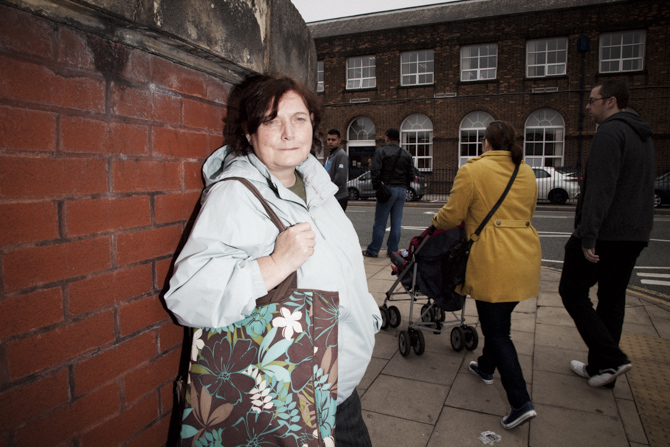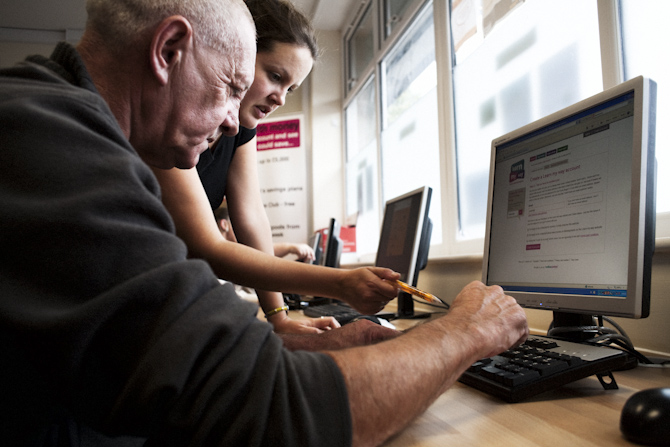I’m nipping in between consultations. Except these are a bit more than consultations. This morning Mike has already had hour-long sessions with two of his new customers and after me, and presumably a bite of a sandwich, he is seeing two more.
He tells me these particular clients – because of depression, ill health, drugs or alcohol misuse – had been ‘parked‘ on Incapacity Benefit for some time, drawing benefit but not expected to find work.
Since the welfare reforms these men, and they are mainly men, find themselves having to get to grips with the flawed Universal Jobmatch online employment site and the increasingly rigorous demands of the Job Centre.
I like that the UCAN can be super-responsive. As a new need arises it adapts what if offers or adds something new into the mix. Which is why Vanessa has commissioned Mike, the CV-writing guru and career coach from Tuesday’s job club, to work closely with a number of hand-picked, long-term unemployed residents.
“There’s a part of Breightmet that is ranked pretty highly among the indices of most deprived areas in the UK,” says Mike. “Bolton at Home has researched the figures and there’s a particularly high incidence of people who are on, or had been on, Incapacity Benefit.”

“So what sort of people are we talking about? Can you describe them?”
“One of the guys has been without regular work for more than 20 years, others for over 10,” says Mike.
“The younger ones obviously less so but with all of them substance misuse is a common theme. Interestingly, There is also an almost universal lack of confidence around literacy, particularly spelling. They can read well enough but writing is an issue.”
“But isn’t the JobCentre helping this group?” I ask. “As you say, they have been economically inactive for so long, surely they can’t be expected to job search without any support?”
“If I was in the JobCentre’s shoes, I’d argue they are being offered a lot,” says Mike. “But it’s inevitably very prescriptive given the volumes of candidates they are dealing with. One guy has been put on the Work Programme for new claimants and another has been sent along to Bury College to have his basic skills assessed… but now he has to wait two or three months before there’s a literacy course available. So there is support, but it tends to be less tailored. Does that make any sense?
“Yes. Yes, it does. But what are you doing differently?”
“I’ve come in with an open mind. We want to make sure their interaction with the JobCentre and with Universal Jobmatch is as positive as it can be. But what is fascinating and unexpected is how much the guys are opening up to me about themselves and about what’s stopping their progress. And there have been things I can do to help.”
“Like?”
“For instance, one guy at the end of our first session told me he was really self-conscious of his teeth. He hadn’t had dental treatment for 10 years and had very bad teeth, so bad they were affecting his self-confidence.
“So I organised a local NHS dentist to see him, even paid for a taxi to get him to one of the appointments and next week he’s being fitted with a new set of false teeth. He’s delighted, he can’t wait.”
“That’s brilliant. I like that.”
“Another guy is nervous of speaking on the phone and so doesn’t have a mobile. Of course, if you’re searching for work, coming across well in a phone call can be important. So I got him a cheap mobile from Asda and some credit and suggested he used it to order takeaway food, for instance. I call him from time to time and he’s even spoken on the phone to Vanessa now. It’s a little step which has improved his ability to function.”
“It comes down to seeing people as individuals, doesn’t it?” I say
“These are little gestures but quick wins, small victories that are showing them we can make progress. What’s fascinating is how freshly motivated a couple of them are at least, to get a job. I’m not going to put myself out here as the ‘fairy jobfather’ but I do think, in the right circumstances, two of them could be employed in the near future by someone and do well.”
“And the others?”
“Motivationally, they’re not quite ready yet.”

This is week four in a six-week project. After his ‘quick wins’ Mike has started working on what he calls ‘reframing’ the life story. “To begin with they’d all talk very negatively about themselves: drug and alcohol problems, being out of work, being homeless maybe. But now we are moving towards a more positive life story.
“We’re beginning to find the positive elements about them and getting them to express them more openly: are they a family man? Do they like working with other people? Maybe they enjoy the outdoors… anything really to get them thinking differently, and expressing their life stories more positively.
“The aim is to them more attractive to employers. None of it is untruthful, just a skewing of their story in their favour really.”
What Mike is doing over six hours isn’t rocket science. He’s building self-esteem, giving people time, allowing them to discover what they’ve got to offer. It’s personal and it’s making an impact.
As a little pilot study there are some important lessons to be learnt… and not just by the UCAN.
“I enjoy the little differences I am seeing already,” he says as I get ready to take his portrait. “And I hope they are too. It’s very satisfying.”
I’m not expert on the welfare system, I’d be the first to admit it. But having been here now for eight months or so, I’ve had the opportunity to listen to the experiences of plenty of benefit claimants.
Certainly I can see that some of the consequences of the welfare reforms – Atos, digital inclusion, bedroom tax – have had a fair amount of negative impact. Spending just half a day in this UCAN can tell you that.
There’s been plenty of talk amongst the staff lately about those that don’t fit easily into the new world of welfare and this morning – because it’s a Friday and the UCAN is closed to the public – I’ve brought Vanessa, Rosanne and Carl together to have a chat.
“Let’s start, if we can, by identifying who we’re talking about,” I say, once we’re settled around the upstairs meeting table.
All three have examples of those with ‘multiple needs’ who, despite their best efforts, are unable to do what the Jobcentre requires of them.
“They might have been on Incapacity Benefit and not worked for many years,” says Vanessa. “They may have drug or alcohol issues, little literacy and no IT skills and now find themselves on a job-seeking benefit.”
“So what’s the problem?” I ask.
“They’re just not receiving the holistic support they need from the Jobcentre to become independent jobseekers,” continues Vanessa. “They are not being assessed properly in the first instance and then the Jobcentre advisor passes them onto us.”
Rosanne chips in: “The advisors are supposed to be assessing literacy and numeracy skills and it just isn’t happening. I phoned the Jobcentre about one customer who they had referred to us who could barely use the computer and I asked how they expected us to support him looking for a job. After I’d been passed from pillar to post, they told me to put him on Universal Jobmatch!”
“Which was precisely the thing he couldn’t use,” I say.
“Exactly.”
“There are certain customers who have multiple issues and need lots of one-to-one,” says Carl, “but we have to hold out hands up and say this is something we can’t provide.”
“So, for many, the new regime of online job search is not working because these customers are so far behind?” I ask. “But, if they don’t keep up with it they could be sanctioned…”
“This is what we’re faced with daily,” continues Carl. “Sometimes it’s just a matter of keeping people out of crisis until they can job search. But even basic IT can takes weeks of practice before they can search for work independently.”
“Perhaps there should be a sanction amnesty, a period where they won’t lose any benefit,” I suggest.
“Yes,” says Rosanne, “an amnesty for sanctions but not for job-searching. They should still have to make the effort.”
“There’s a massive knock-on effect for someone who’s not treated appropriately,” says Carl. “If they are sanctioned unnecessarily and get into financial hardship…”
“Which they will,” I interrupt.
“…which they will. Then it brings up other issues around self-esteem and confidence and often anxiety and depression.”
“Our relationship with the Jobcentre is getting better,” says Vanessa positively, “but there still needs to be more understanding of what we as UCANs can realistically achieve for those with deep-rooted issues.”
“And, it seems, the initial assessment by the JobCentre needs to get more rigorous,” I suggest.
“You don’t have to be a counsellor to pick ups some of the important clues when a person is sitting in front of you,” says Vanessa.
Elsewhere on this blog I’ve written about how the UCANs are flexible enough to adapt the services they offer to their local clientele depending on need. It’s one of their selling points. So it comes as no surprise that Vanessa tells me she has already put in place a pilot project aimed at just the group of people we are discussing.
“It’s for those who had been on Incapacity Benefit for some time and have now been moved over to Jobseeker’s Allowance,” she says. “Mike, our CV-writing expert, is running it over the next six weeks. We want to see how they are coping and what, if anything, needs to change for them.”
“That sounds really interesting,” I say, “I should have a chat with Mike.”
“Brilliant,” says Vanessa.
It’s two weeks later and I am walking with Morag through the town centre to one of Bolton’s two Jobcentres. A report on the radio this morning suggested there are nearly as many new store openings on UK high streets as there are closures. Bookmakers, charity shops and pawnbrokers top the list of new openings.
“When did you last have a job?” I ask as we negotiate a busy crossing.
“Because of my health I haven’t worked for 27 years,” says Morag, “except for a few weeks as a classroom assistant. I’ve been on Incapacity Benefit. But now I’ve been put on Jobseeker’s Allowance. I came yesterday to sign on and this morning I’m seeing my advisor. I have to show I’ve been looking for work.”
“What happens if you can’t show you’ve been looking?”
“They can sanction you. They can take some of your money from you.”
We reach a nondescript two-storey building opposite a bingo and casino complex. It must only recently have become a Jobcentre because the only signs yet up are those declaring the building is protected by G4S.
“Cath said I have to go in with a positive attitude. I’m supposed to smile… to say it’s been nice weather. The woman will look at me as if I’m mad.”
Morag says she’ll be ten minutes but it’s nearer half and hour before she is out on the pavement again.

“So what did you say to her?”
“I said, Good Morning!” she says in a high-pitched, cheery voice. “But she just said, Yeah.”
“And what did you talk about?”
“She went through my CV but wasn’t very happy. She said there was no point saying I wanted to be a classroom assistant on a CV that I was sending in for a retail job. I have to do more specific ones for particular types of jobs.”
“That makes sense. Do you know how to do that?”
“There’s someone at the UCAN job club who will help me. He’s really good with CVs.
“And then there’s a thing called Universal…” Morag thinks for a second, “… Universal Jobmatch. You have to register online and they give you a number. And you have to keep logging in with that number and going through all the jobs. That way they can see if you are actually looking for work.
“She said for next week I definitely have to be on it, otherwise she could dock money off me. She might say I haven’t earned my money one week and that will be it. You have to toe the line.”
“And how much do you get each week on Jobseeker’s Allowance?”
“£71.70.”
“£71.70? And how much do you have to live off after bills and that?”
“£15 a week before I’ve bought any food. They’ve taken £160 a month off me.”
“We should sit down and have a longer chat,” I suggest.
We’re all sat in the front room, practically eating our lunches off mouse mats – the computers and keyboards take up most of the available desk space.
Carl is closest to the front door and jumps up each time there’s a knock. “We’re open again at half past,” he repeats politely, “we’re just getting ourselves something to eat. Are you all right to come back in half an hour? Great, see you later.”
Between mouthfuls of pasta from a plastic tub, Vanessa, the UCAN manager, tells me that the afternoon is set aside for an IT class. “It’s very relaxed,” she says. “We’ve discovered that a drop-in works better than a formal course. Customers don’t have to stay for the whole session – which can feel daunting – but most of them do.”
“If people can get to know how the computer works then they are more likely to access services online. If we are being posh, we’d call it digital inclusion.
“Last year the government changed the way jobseekers look for work. All new jobseekers now have to set up a government online account – which is challenging enough – and then upload a CV before they can start looking for a new job.
“The theory is great if you are IT savvy,” she says. “But when you mention uploading a CV to some of our customers you might as well be talking a different language.”
“So, if someone finds themselves out of work,” I say, “it could be several weeks before they are able to learn the necessary IT skills to apply for another job?”
“Yes, some have never touched a keyboard before,” says Vanessa, “and it was bedlam in here when it was first introduced. People were dead nervous.
“The CV is now the Willy Wonka golden ticket,” she says. “Gone are the noticeboards in the Jobcentre, all the available vacancies are now online on what’s called the Universal Jobmatch. And the Jobcentre can now check whether you’re actively searching for a job and impose sanctions if you’re not.”
As plates and mugs find their way back to the kitchen sink, freelance IT tutor Charlotte, arrives and within minutes four participants follow and settle themselves in front of a screen. I explain to Charlotte and her class about this blog, “I’d like to take some pictures if that’s okay with everyone, and maybe ask a few questions.”
“Paul is one of our star pupils,” says Charlotte, pointing out an older man who has already logged on. So I start with Paul.
“Seven months ago I was made redundant from my job as a driver,” he says. “For ten years the only computer I’d used was the sat nav! I didn’t even know how to switch one on.”
After coming to a few Monday afternoon sessions Paul says he found his way round the PC. “It’s no problem now. I’m starting a new job tomorrow and they asked if I could use a computer and I said I could. So I’ll be doing some forklift truck driving and keying in goods in and goods out, that sort of thing. They’ll show me what to do, won’t they?”
“I’m sure they’ll give you some training before they let you loose,” I say. “Do you mind me asking, how old are you Paul?”
“61.”

Another older man comes in as I’m talking to Paul and I overhear him tell Charlotte that he needs some help uploading his CV onto the Universal Jobmatch site. “That’s fine,” she says, “and it’s something I can help you with but I try and start everyone off with a little online course about finding their way around the keyboard. Are you okay if I set you off with that first?”




